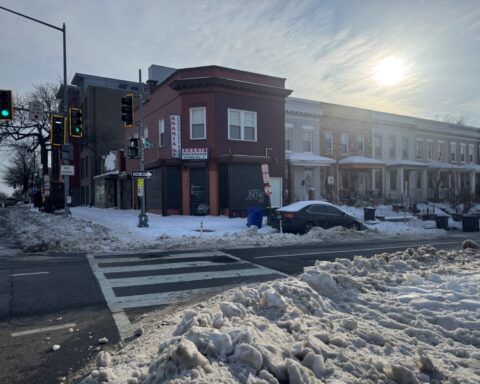In Washington, D.C., the effects of deportation hit especially hard in Black and brown communities, says Immigration Attorney Marina Blake.
“Just this past week, I had two clients who told me they were contemplating suicide,” Blake said.
Blake is an experienced immigration lawyer who has practiced for over 25 years and worked with numerous Black and brown families facing the threat of being deported.
The emotional and mental toll that Blake speaks about is not an anomaly; it’s part of a larger, more deeply instituted issue within the immigration system. To get more information into the legal and systemic side of deportation, Professor Jayesh Rathod, director of the Immigrant Justice Clinic at American University, who has worked directly with families impacted by deportation in the D.C. area shared how enforcement policies and racial bias disproportionately affect Black and brown immigrants, particularly in cities like Washington, D.C.
“Black immigrants are disproportionately represented in the immigration detention system… and that doesn’t surprise me because of the pipeline from the criminal legal system to the immigration removal system,” Rathod said. He also added that anti-Black bias that is seen in the criminal justice system is “reproduced in the immigration system.”
Latinos make up the majority of deported individuals, but studies have shown that Black immigrants are disproportionately affected by enforcement actions and often face harsher outcomes. According to the Black Alliance for Just Immigration (BAJI), Black immigrants are more likely to be detained for longer periods and are deported at higher rates for similar offenses compared to other groups.
Racial profiling by both by local law enforcement and federal immigration agencies increases their risk of being targeted. In cities like Washington, D.C., where local police have historically worked with ICE, these communities live under constant fear of detention, even for minor infractions.
Rathod also mentioned how the deportation process works and who it targets.
“You don’t have to be undocumented to be deported,” he said. “You can have a green card and still get deported… Even one conviction of certain offenses, even relatively minor ones, can be enough.”
He explained that under the Immigration and Nationality Act, both undocumented entry and certain criminal charges can cause removal proceedings.
For children and teens, the impact of deportation can have an even greater effect.
“There’s actually quite a robust literature on this exact topic,” Rathod said. “Studies pretty consistently show that family separation, and particularly the stress of having a parent in the immigration system, can have an adverse mental health impact on youth.”
He emphasized that these effects go beyond emotions; they influence behavior and education as well.
“If you’re trying to be in school but have this gray cloud hanging over your head about your immigration status, it’s going to create social stigma and shame, and that impacts your school performance.”
Rathod also spoke about the financial stress and limited future opportunities as long-term effects for students with deported or detained family members.
“If the parent was the main breadwinner and then was detained, it puts the family in financial distress,” he said. “Students might not qualify for federal financial aid, and they may carry the burden of supporting the family.”
As for whether the system is fair or not, Rathod didn’t hesitate: “Unlike criminal defense, you don’t have a right to an attorney appointed by the government because it’s considered a civil matter… Even young kids don’t have representation and that kind of speaks for itself.”
Rathod questioned the fairness of the justice system, pointing out that immigration court decisions can be heavily influenced by the political climate and policy shifts.
Still, the ripple effects of deportation extend far past the legal process. It reshapes entire communities, forcing families to isolate, children to hide parts of their identity, and neighborhoods to become quieter and more withdrawn.
“People just aren’t out in public as much anymore,” Rathod said. “That’s already a sign that behavior is changing.”
Blake emphasized the emotional damage caused by deportation, particularly for children.
“Children are traumatized when their parents are ripped from them,” she said.
This fear is not only emotional but also structural. When deportation is a lingering threat, families avoid hospitals, schools, and government services even when they desperately need them.
“Some parents have stopped their children from going to school altogether,” Blake said. “They’re terrified that immigration officials will use the child as a way to find and detain the parent.”
The fear of being detained also stops many from having basic legal protections or speaking out about injustice, Blake explained.
“Most people are not seeking mental health services, even when they desperately need them, because they don’t trust the system. They don’t know if the person they talk to might report them.”
Despite these challenges, Rathod and Blake agree that immigrant communities show a lot of strength and resilience.
A lot of families live through the trauma of deportation firsthand, the lingering effects are also deeply felt by second-generation immigrants those born in the United States to immigrant parents. For some, the fear of deportation may not be personal, but its impact on their communities, families, and close friends is just as real.
Russell Antwi, a second-generation immigrant, shared his story to give detail into what it’s like to grow up in the shadow of immigration policies that have shaped the lives of people around him. Though he was born in the U.S., his family’s journey to this country continues to inform his perspective.
“I was born in the United States so I don’t really have an immigration story,” he said. “My mother immigrated here from Nigeria when she was 16, which I feel is kind of unique as she had both the high school and college experience in the United States. My father immigrated to the United States from Ghana in the early 20s after a brief stint in the UK. When they arrived, they both stayed with family as they were able to assimilate into American culture.”
But for Russell, deportation still hits close to home. He speaks on the time his grandmother overstayed her visa and was held in a deportation camp.
“It was a scary experience,” Antwi said. “She didn’t remember the name she used to enter the country… but thankfully, the climate around immigration from African countries at that time was slightly more amicable. Thank God, she was able to return back to her home country of Ghana.”
“As traumatic and unjustified as deportation can be, many people I’ve worked with have already thought through the worst-case scenarios,” Rathod said. “They are survivors but that doesn’t mean they should have to suffer in silence.”
Gabriel McDonald is a reporter for VoicesofTomorrow.news through the Howard University Multicultural Media Academy. He attends Baltimore Polytechnic Institute in Baltimore, MD.











